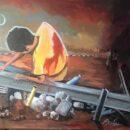The Bombing of Shigeg Karo and the Miserable Response
Posted on behalf of Julie Flint.
At 2 pm on Sunday 4 May, a single Antonov bomber targeted the village of Shegeg Karo in North Darfur, destroying the market and hitting the village school during classes. At least 11 people were killed outright, six of them children between the ages of five and eleven. More than 30 were injured, half a dozen seriously. Forty-eight hours later, villagers began driving the most badly injured””including an eight-year-old girl believed to have a broken back””in search of treatment.
It was the bloodiest Antonov attack in Sudan in years””possibly the most lethal since 14 children and a teacher were killed in Kauda, in the Nuba Mountains, on 8 February 2000. Darfur is the focus of the world’s largest peacekeeping operation, UNAMID, and largest and most vocal activist movement. Yet for a full 48 hours no-one got to Shegeg Karo to get the wounded out and medical aid in””not UNAMID and not the ICRC, both of whom have aircraft””and the only voices reporting the atrocity were Reuters and the BBC’s Network Africa.
When the “slaughter” we are told never ceases in Darfur actually happened, with children at the heart of it, the reaction was miserable. It is difficult to know which is more shocking: the attack itself””or the manifest failure, at all levels, of the international community to respond to it.
Not the failure to respond adequately. The failure to respond in any way at all.
There is much we don’t know yet, and much that isn’t clear. Why, for example, did the ICRC not move? Did the government block them, as it has so often in the past? How was it that UNAMID flew to the wrong village“”Ein Bessar””on Monday, despite having had details of the attack on Shegeg Karo since Sunday? (Ein Bessar is in the east of North Darfur, north of Mellit; Shegeg Karo is in the west, between Furawiya and Muzbat.) Once UNAMID officials realized that their initial coordinates””for Ein Bessar””were the wrong coordinates, they requested government permission to fly to Shegeg Karo. By their own admission, they received this permission “on the morning of 6 May”. Why, then, did they not go to Shegeg Karo in the course of the day? Why did villagers have to load up the injured children in the afternoon and drive them across the desert””to meet the ICRC in Bir Maza, a village many hours away?
Contrast this incompetence with the round-the-clock efforts of a handful of individuals””including Jen Marlowe and her Sudanese colleagues in Darfur Diaries, the American NGO that funds the Shegeg Karo school””to gather precise information and get it out. They informed the UN””the Department of Safety and Security””two hours after the attack took place and UNICEF soon after that. UNICEF contacted the ICRC. Reuters contacted UNAMID before its story went out on Sunday. By Monday, everyone who mattered knew everything they needed to know, including the ages of the children and the extent of their injuries. (One of our main concerns was to spare survivors the added agony of a long and bumpy car journey across the desert.) Mia Farrow, who helped raise the funds for the school, e-mailed the US special envoy, Richard Williamson, who raised the matter at a meeting of donors and the Sudan government in Oslo on Monday morning. Others contacted governments, medical NGOs, activists.
Nothing happened. There seemed to be no plan even. First we heard that UNAMID was going to drive from Um Berro to Shegeg Karo to pick the wounded up. Then that it was going to fly. Then that it wasn’t: the ICRC was. Then that the ICRC wasn’t either. And so the eight-year-old with a broken back lapsed into unconsciousness. The boy with the broken limbs and heavy blood loss lost more blood, but somehow stayed conscious.
Apart from the continuing impunity of the Sudan government and the stunning incompetence of the aid response, the tragedy of Shegeg Karo highlights the lamentable lack of an international presence in North Darfur in general. Much of the area had been peaceful until very recently. Shegeg Karo itself has been untouched since the firestorm years of 2003-4. Had there been a greater international presence on the ground, it would have been easier to respond to the attack. It might even have prevented it happening.
Today Shegeg Karo has needs beyond its immediate medical needs. Until Sunday, the village had two hand pumps. The Antonov bombardment damaged one, and villagers have been queuing all night to fill jerry cans from the last remaining pump. They are asking for spare parts for the damaged pump. We are asking why help was not forthcoming for 48 hours, and what is being done to ensure that this never happens again.







Shigeg Karo shames us all.
In the case of Shigeg Karo, so many of the adjectives used so liberally to describe Darfur really do apply. The victims were indisputably innocent civilians. The attack was unprovoked (there are accounts, unconfirmed, that rebel commanders passed through the area a few days before–which even if true scarcely counts as military necessity). The bombing was indiscriminate (some other incidents of aerial bombardment, for example by MiG fighter bombers last year, were relatively well-targeted). The attack was in violation of repeated commitments made by the Sudan government, notably in the 8 April 2004 N’djamena Humanitarian Ceasefire Agreement and the 5 May 2006 Darfur Peace Agreement, not to conduct hostile military flights. The true number of those killed by aerial bombardment in Darfur over the years is not known, but the data from mid-2004 are pretty good–and this is the worst single incident in that time period.
In inaction in response is quite shocking. Billions of dollars are being spent on a UN mission with a mandate to protect civilians–its response fell short of expectations. There is a vast activist movement across the world, but when there was real-time news out of Darfur, the burden of reacting fell on the shoulders of just a handful of individuals.
Was it a co-incidence that the plane hit the school funded by Mia Farrow? A GOS hit against a non-acceptable NGO? It seems like the situation is polarizing in Darfur.
Thank you for this detailed description of the events in Shegeg Karo last Sunday. As you say Alex, the international response shames us all, and is a deeply distressing indicator of UNAMID’s curent inability to go successfully fulfill its mandate.
On May 31, representatives of the 15 country representatives of the UN Security Council will leave for a 10-day visit to the African continent, including a stop in Sudan.
How can this visit actually help change the international response to atrocities like this and move beyond the current of public hand-wringing and circular buck-passing? Do you think that Amb. Williamson raising the emergency in Shegeg Karo will lead the international community to make any changes in its approach to Sudan as a result of the lessons of this response? What should U.S. policymakers and other officials in donor countries do to best ensure that as UNAMID slowly scales up its capacity, it does so in a way that is both immediately impactful and conducive to a sustained effective presence, especially vis-a-vis relations with humanitarian orgs and local civil society?
In response to Vagn’s question, I think that the bombing was most probably indiscriminate. The pilot was likely dispatched to seek out a military target, couldn’t find it, and offloaded his bombs on the nearest target rather than return to base with a failed mission.
Michael makes some important points. What use is a Chapter VII mandate if the force cannot find the right location? Or won’t fly without guarantees of safety? Why does the UN not have liaison officers in every town held by the armed movements? Why are there no international humanitarian organisations in areas of north Darfur that have been stable and under the administration of SLA-Unity for months if not years? Operating in non-government held areas used to be standard practice for the more courageous NGOs–what has happened to this tradition?
But there’s another question, what can be done today? The dead and injured children of Shigeg Karo are not just another statistic that is grist to a mill of condemning Khartoum. They are real people and the purpose of the advocacy and international presence in Darfur should surely be to make a real difference to real people. When it came to saving the critically injured schoolchildren of Shigeg Karo, who stepped up to the plate? In trying to “Save Darfur”, we should not neglect saving Darfurians when they really need help.
So I can tell how terrible Omar al-Bashir is from other wesites and such but is there anything good about him or his reasoning for “ethnic cleansing”? This post is more of a question rather then a reply,
Thanks!
In my life I have found people often are blind to what is screaming in front of them and my never see the forest for the trees, this artical is over a year old and I found it by chance I will pray for the children … Hugs Grandma Scott